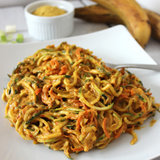A study from the Journal of the American College of Nutrition, the official publication of the American College of Nutrition, analyzes the effects of consuming a galactose carbohydrate (CHO) drink on substrate oxidation, postexercise satiety, and subsequent energy intake in females. The research examines the effects of a sports drink containing galactose vs. a sports drink containing glucose vs. an artificially sweetened placebo.
The study examines nine recreationally active eumenorrheic females who undertook 3 trials, each consisting of running for 60 minutes at 65% VO2peak followed immediately by a 90-minute rest period. Prior to (300 ml) and at 15-minute intervals during exercise (150 ml), participants consumed either a glucose (GLU: GI 89) or galactose (GAL: GI 20) drink, each of which contained 45 g of CHO, or an artificially sweetened placebo (PLA). A galactose sports drink is similar to any other commercially available carbohydrate-based sports drinks, i.e. Lucozade, powerade, yet it contains a different type of sugar, being galactose, compared to the usual sugar found in these drinks, glucose. As a sugar, galatcose has a lower glycemic index and is therefore slower releasing, something that may benefit in terms of less of an impact on reductions in fat oxidation and prolonging satiety (i.e. feeling full). Following the rest period, participants were provided with an ad libitum test lunch and asked to record food intake for the remainder of the day.
Plasma glucose was significantly greater throughout exercise and rest following the GLU trial compared with the GAL and PLA trials (P
The results demonstrated that ingesting a solution containing GAL before and during exercise can positively impact post exercise satiety and energy balance throughout the day, compared to a more readily available and widely consumed form of CHO. Despite this, there appears to be no apparent benefit in consuming a CHO beverage on fuel utilization for this moderate exercise intensity and duration.
Article: Effect of Galactose Ingestion Before and During Exercise on Substrate Oxidation, Postexercise Satiety, and Subsequent Energy Intake in Females, Lauren C. Duckworth PhD, Susan H. Backhouse PhD, John P. O’Hara PhD & Emma J. Stevenson PhD, Journal of the American College of Nutrition, doi: 10.1080/07315724.2014.994790, published online 1 May 2016.





